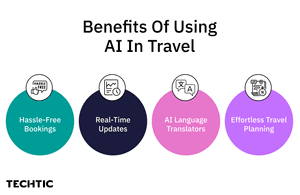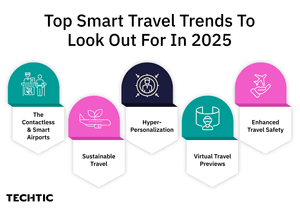The Future of Smart Travel: Leveraging AI to Unlock Personalized Experiences
Sector: AI + Data
Author: Nisarg Mehta
Date Published: 12/30/2024

Contents
- How AI technologies drive Smart travel
- Personalization: The Heart of Smart Travel
- Exploring How AI Can Make Travel Better
- The Smart Travel Trends to Watch in 2025
- Ethical Considerations and Challenges Set Forth in These Projects
- How AI Can Position Your Business for Competitive Advantage
- Conclusion: Smart travel is already here, and this is the future
AI is no longer science fiction—it’s becoming the backbone of many travel experiences today. Think about your last online trip booking. Chances are, an algorithm recommended the perfect flight or a dream hotel just steps from the Eiffel Tower. That’s AI in action, quietly revolutionizing how we plan and experience travel.
Think about a time when Chatbots functioned as virtual travel agents to tell us what is best; AI predicting travel demand like a crystal ball and so on. The fervor originates with platforms like Booking.com and Expedia, which in addition to using machine learning to process historical search patterns, draw on lie detectors in a bid to tailor their recommendations. At the same time, airlines are using AI to develop routing that makes travel both more fuel-efficient and smoother.
And this also involves AI, even in the airport. Facial recognition technology cuts down security line waiting times, and AI-powered baggage systems ensure ‘lost luggage’ becomes a topic for a history book. In short, AI is the ultimate co-pilot for the travel industry delivering seamless experiences for people and businesses!
How AI technologies drive Smart travel
Seamless travel experiences are possible because a suite of cutting-edge AI technologies is transforming the way we explore. Let’s uncover the brains behind the brilliance:
Natural Language Processing (NLP): The Multilingual Travel Buddy
The days of fumbling through phrasebooks are over. Thanks to NLP, AI-powered chatbots and voice assistants can now handle everything from answering complex travel queries to translating local phrases like a polyglot. Picture asking your phone, “Where’s the best sushi in Tokyo?” and getting a perfectly curated list in seconds.
Machine Learning (ML): The Ultimate Travel Fortune Teller
Ever wondered how platforms seem to know when you’re planning a trip? ML works on endless streams of data; your clicks, searches, and preferences help predict what you’ll need next. From predicting flight prices to fine-tuning personalized travel itineraries, ML is the algorithmic magician behind the scenes.
Computer Vision: Smarter Security, Cooler Memories
From automating passport checks to recognizing faces at airport gates, computer vision makes travel less stressful and more secure. But it’s not all about efficiency—this tech also powers smart photo apps that enhance your travel snaps with AI filters, turning that dull sunset into a masterpiece.
Generative AI: Travel Content Like Never Before
Generative AI is transforming how destinations market themselves. The places come alive in front of you before you even set foot on them with AI-generated blogs, social media posts, and even VR tours. It’s really not just about marketing, it’s wanderlust on steroids.
Smart travel is driven by these technologies which can be used to ameliorate customer service, logistics, or transform a travel dream into a reality.
Personalization: The Heart of Smart Travel
Well, face it, no two travelers are alike. One is the wandering backpacker seeking to traverse the Andes, and the other is the luxury seeker after sun and sand at Bali spas. That’s where AI is really good, making travel personalized experience and feeling like it was built by someone just for you.
Custom Itineraries: Your Personal Travel Architect
Imagine an AI assistant analyzing your interests, budget, and travel history to create an itinerary that matches your vibe. Prefer wine tasting to skydiving? AI knows. Love boutique hotels with a view? Done. Platforms like Google Travel and TripAdvisor are already delivering curated options that feel like a personal concierge service.
Data-Driven Recommendations: The Netflix of Travel
AI sifts through oceans of data to suggest activities, restaurants, and destinations based on your preferences. It’s like having a Netflix recommendation engine—but instead of movie nights, you’re getting tips for adventure-packed days and serene evenings.
Hyper-Personalized Offers: Deals That Matter
No more generic discounts that don’t apply to your dream trip. AI can analyze your browsing habits and send personalized deals—like a discounted flight to Santorini just when you were daydreaming about those iconic white rooftops.
AI personalization guarantees that each trip isn’t just a trip, but your trip. With access to the power of data and the use of machine learning, smart travel is revolutionizing how we travel and turning every journey into a valuable, meaningful experience.
Exploring How AI Can Make Travel Better
But it’s not just planning your trip, though – AI is there alongside you, making sure your journey runs smoothly and intuitively and just feels downright good. AI has your back — from hassle-free bookings to live updates.

Booking and Customer Service without Interruption
Do you remember trying to figure out clunky websites or waiting hours for a customer service response? Those days are over. Today, there are AI-powered chatbots like Amadeus’s AI assistant, which handles bookings, answers queries, and even solves complaints in real-time. AI chatbots are fast, efficient, and always around.
Real-Time Updates and Alerts
Even the best-laid plans can be ruined by missed flights and unexpected flights. Not only do they predict price drops, but AI tools such as Hopper also notify travelers about gate changes, and weather disruptions and allow for real-time alternative travel routes. It’s kind of like your personal travel secretary whispering you little updates.
The language translators powered by AI
Lost in translation? Not anymore. Google Translate, for example, uses the power of AI to conquer those language barriers — whether you’re trying to read a menu in Kyoto or to haggle a tuk-tuk fare in Bangkok. Bonus: What’s more, some apps even work offline, so you don’t have to mime when there’s no Wi-Fi available.
Effortless Travel Planning
Imagine you ask your AI assistant, ‘I’d like to go hiking and wine tasting over a weekend.’ It will have an itinerary with dates and venues laid out in a few seconds. Other apps like Utrip are making this happen, transforming the idea of going on a trip into an actual plan to take, with bookable offerings.
From planning, to travel, to post-trip reflections, AI is making travel less of a logistics and more about pure exploration.
The Smart Travel Trends to Watch in 2025
Smarter travel is the future and it is here. Here’s a glimpse into what’s just around the corner:

1. The Contactless and Smart Airports
Long lines and endless paperwork are now a thing of the past. Facial recognition systems powered by AI and biometric check-ins are turning into hubs of seamless efficiency. Bulk automated security checks, baggage tracking apps, and everything in between will make your curbside to boarding gate experience akin to a breeze.
2. Sustainable Travel with AI
AI is being used by airlines to minimize emissions and optimize flight paths and by hotels to utilize energy management systems that learn and adjust to guest behavior. Want to find an alternative low-carbon travel? AI’s got you covered.
3. Hyper-personalization finally goes mainstream
It’s leveling up to personalization. In the near future, AI will use real-time data to make instances far more specific to you. So just think of last-minute restaurant suggestions based on your mood at the moment, or weather-adjusted suggestions for activities that change on the fly.
4. The Metaverse Meets Travel
It is not just virtual reality making way for digital tourism, the metaverse is poised to push the bars even higher. Picture you walking the streets of Paris or visiting Machu Picchu virtually before making a reservation to visit. These hyper-real previews will be powered by AI – mingling technology with wanderlust.
5. AI-Driven Safety
In addition to AI helping monitor travel advisories, it’ll also play a critical role in detecting health risks that could cramp a traveler’s style. AI will send real-time alerts for natural disasters, traffic disruptions, or political unrest, allowing for smarter and safer decisions on the go.
That convenience is much more than just convenience; it’s a way to make travel more immersive, sustainable, and secure. Exploration is no longer just how we go about AI, but how we are transforming the journey that’s just as exciting as the destination.
Ethical Considerations and Challenges Set Forth in These Projects
AI is revolutionizing the travel industry — but not without its problems. Its great potential comes with enormous difficulties and ethical questions that need to be addressed. So let’s unpack the flipside of AI-powered travel.
1. Data Privacy: Who Owns Your Travel Data?
Since AI works on data, your preferences, habits, and your location are all data that it thrives on. But where does this data go? Travelers share their most intimate information without even knowing it, and that creates issues with privacy and security. Transparency and robust encryption are what businesses have to emphasize, in addition to protecting users from data breaches and misuse.
2. Over-Automation: Loss of Human Touch
Although AI is taking over customer service and trip planning, there’s a thin line where it becomes efficient and alienating. I love chatbots since they provide quick fixes, but they don’t bring the empathy and cultural insights that human agents do. Finding the perfect balance between the use of automation and personal engagement is the answer to this challenge.
3. Bias in AI Algorithms
The ability of AI to recommend personalized travel options depends on its training data. But biased algorithms can accidentally exclude or mischaracterize specified demographics, and lack diversity. The fairness of AI models is critical to offering fair experiences for all travelers.
4. Facial Recognition in Ethical Use
Although airport security has been enhanced with facial recognition technology, there are arguments over surveillance and consent. Travelers walk unknowingly into this, and there are no clear regulations protecting them. This technology is certainly in its infancy, and the first thing that must be done is to establish ethical guidelines for the technology.
5. Environmental Impact of AI Infrastructure
Ironically, AI is helping sustainable travel, yet its infrastructure requirements like energy-intensive data centers can create a major carbon footprint. In order to deploy AI without getting in the way of environmental goals, the industry will need to find greener ways to do it.
As the smart travel revolution unfolds, dealing with these challenges will allow us to benefit from AI enhancing the travel experience while ensuring AI adds to the experience, responsibly and inclusively.
How AI Can Position Your Business for Competitive Advantage
And AI isn’t just a game changer for travelers, it’s a golden ticket for businesses in the travel industry. Here’s how travel businesses can make the most of this transformative technology:
1. Personalized Marketing Campaigns aka the Trend of The Year
AI is great for analyzing customer data to craft hyper targeted marketing campaigns. They can create personalized offers – for example, special deals for sun seekers on tropical getaways tailored to a user’s preferences and search history. Think of it like a crystal ball that can see into the future what your customers need before they do.
2. Dynamic Pricing Strategies
Companies can adapt their pricing in near real world terms as dictated by demand, seasonality or any other market trends using AI powered algorithms. This strategy is already being used by airlines and hotels in maximizing revenue without losing out on competitive rates. In fact, dynamic pricing is the art form of AI.
3. Enhanced Customer Engagement
Inquiries can be responded to, bookings taken, and instant solutions can be provided—24/7, via chatbots and virtual assistants. The benefit of these AI tools is that they not only boost customer satisfaction, but also frees the human agents from tedious tasks at hand, and lets them handle more complex ones instead. It’s a win for businesses, and it’s a win for travelers.
4. Streamlined Operations
From how to schedule flights to what inventory management processes you should do, everything is optimized with AI. For example, airlines can use predictive analytics to reduce delays, for example, by figuring out maintenance needs before there are issues. Hotels can, too, use AI to predict demand and consequently more efficiently allocate resources.
5. Building Immersive Experiences
With AI, businesses can create interactive tools to enrich customer’s experiences. Virtual reality previews of hotel rooms or AI generated travel itineraries that adjust in real time are a thing of the future. These innovations cause a “wow” factor that will set businesses apart from everyone else in a cramped up market.
Using AI is not about keeping pace, but about outpacing. For travel companies looking to take their future head on, AI opens up infinite chances to invent, scale and thrive in a consistently adjusting industry.
Conclusion: Smart travel is already here, and this is the future
For businesses, the message is clear: Using AI is no longer an option, it’s a necessity. Those that tap into this capability, besides enhancing customer experiences, will therefore be ahead of the curb in a highly dynamic sector.
Therefore, smart travel is here, and it’s the future. For a traveler dreaming of smarter adventures or a business daring to explore new opportunities, the future is here. The journey is bound to be as fun as the destination with AI by your side as co pilot.
So, if you’re interested in exploring AI opportunities for your business, you should consult with experienced AI experts in the travel industry. We, at Techtic, have a dedicated team of AI experts that provide consultancy to travel businesses wanting to adopt AI. Book a free consultation today!
Latest Tech Insights!
Join our newsletter for the latest updates, tips, and trends.



